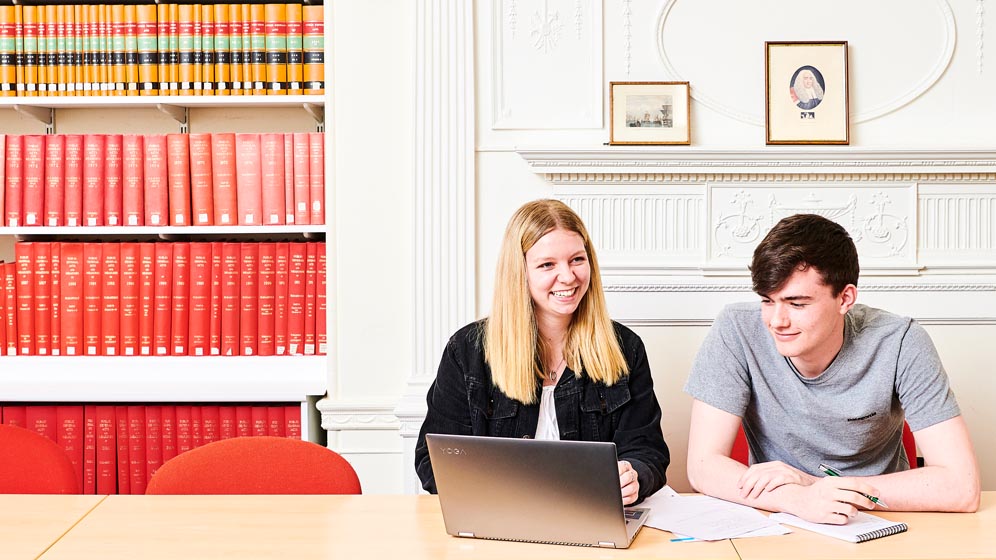Global Law LLB Honours
- UCAS code: M105
- Full time
- 4 years
Gain a global perspective of law and an understanding of how legal systems across the world respond to the challenges and opportunities of globalisation.
You are currently viewing course information for entry year: 2026
Next start date:
- September 2026
UCAS Institution name and code:
- NEWC / N21
Course overview
The challenges the world is facing need global responses. From climate change to technological innovations, legal systems are adapting to address issues that transcend domestic borders.
Our Global Law LLB equips you with the knowledge to tackle these issues and understand the complexities of law in a global context.
You’ll develop a strong grounding in the UK legal system and comparative law techniques, as well as EU and international law and its institutions.
Optional modules allow you to pursue your interests in specialist legal areas such as:
- Global intellectual property law
- Environmental law
- International human rights law
Why study the Global Law LLB at Newcastle?
- Global insights. Gain disciplinary insights into different legal systems and legal cultures from around the world. Study key topics across EU and international law.
- Contemporary focus. Delve into specialist subjects and examine how law responds to today's global challenges.
- Comparative perspectives. You'll draw on experiences in other jurisdictions through comparative law perspectives.
- Access to experts. Interact with leading experts across the fields of global public and private law.
- Develop expertise. Develop skills in analysis, legal research and legal argumentation.
- International experience. Spend stage 3 at one of our prestigious international partner universities. Draw on the experiences and skills developed during your international exchange year to strengthen your prospects with graduate recruiters.
Global Law opens up career opportunities in a range of globalised sectors. You'll be well positioned to use your skills and knowledge to tackle the challenges facing today’s globalised world. You'll also develop the insights to thrive in a career in global legal practice.
Sorry, you need JavaScript to view this video
Your course and study experience - disclaimers and terms and conditions
Please rest assured we make all reasonable efforts to provide you with the programmes, services and facilities described. However, it may be necessary to make changes due to significant disruption, for example in response to Covid-19.
View our Academic experience page, which gives information about your Newcastle University study experience for the academic year 2025-26.
See our terms and conditions and student complaints information, which gives details of circumstances that may lead to changes to programmes, modules or University services.
Quality and ranking
Professional accreditation and recognition
All professional accreditations are reviewed regularly by their professional body.
Modules and learning
Modules
The information below is intended to provide an example of what you will study.
Most degrees are divided into stages. Each stage lasts for one academic year, and you'll complete modules totalling 120 credits by the end of each stage.
Our teaching is informed by research. Course content may change periodically to reflect developments in the discipline, the requirements of external bodies and partners, and student feedback.
Featured Module
LAW3254: Animal RightsThis module will introduce you to the developing field of animal rights law. It combines a historical background of the animal rights movement with an analysis of black letter law, jurisprudence, public international law and comparative international law.

Optional module availability
Student demand for optional modules may affect availability.
Full details of the modules on offer will be published through the Programme Regulations and Specifications ahead of each academic year. This usually happens in May.
To find out more please see our terms and conditions
In Stage 1 of this programme, you will be introduced to Global Law. You will develop an overview of the challenges facing the international legal system and the institutions working within it. You’ll review case studies from Newcastle Law School researchers, focussing on environmental challenges and technical innovation.
During Stage 1 you’ll study compulsory modules where you’ll be introduced to the foundations of legal studies. You'll learn about key legal areas such as constitutional law, contract, and the UK legal institutions. You'll gain an introduction to the principles of administrative law and the protection of human rights in the UK, and the relationship between UK and EU law post-Brexit. Stage 1 modules provide you with the skills and legal techniques to develop your legal thinking and expression.
Modules
| Compulsory Modules | Credits |
|---|---|
| Legal Institutions and Method | 20 |
| Constitutional Law | 20 |
| Contract Law | 20 |
| Administrative Law and Human Rights | 20 |
| The UK and EU Law | 20 |
| Introduction to Global Law | 20 |
In Stage 2, there are a number of core modules that progress from Stage 1 and complete the foundations of legal knowledge, helping you to further develop your legal skills. In semester one, you’ll gain an understanding of criminal, land and tort law, and in semester two, you will study a compulsory equity module.
During Stage 2 you’ll also study a compulsory module in Global Private Law where you’ll be introduced to international private, transnational private, comparative tort and comparative contract law, and a compulsory module in Public International Law.
Within Global Private Law, you will study from selected case studies taught by Newcastle Law School experts in private law, for example an introduction to Islamic finance or global competition law. This module provides a grounding in private law that can be developed through optional modules across the degree programme.
Modules
| Compulsory Modules | Credits |
|---|---|
| Land Law | 20 |
| Criminal Law | 20 |
| General Principles of Tort | 20 |
| Equity and Trusts | 20 |
| Public International Law | 20 |
| Introduction to Global Private Law | 20 |
You’ll spend Stage 3 of your degree studying at one of our international partner institutions and you’ll complete an individual-directed global research project, drawing on what you have learnt in your year abroad.
During the exchange year abroad, you’ll have the opportunity to increase your understanding and awareness of different legal systems, gain intercultural perspectives, and to demonstrate organisational ability, teamwork, and the ability to adapt, and to operate in a different culture.
| Module | Credits |
|---|---|
| Global Experience for Year Abroad Students | 120 |
Stage 4 will allow you to select modules from a range of optional modules, plus a compulsory module in Global Constitutional Law.
You will take 100 credits of optional modules. Up to 40 of these credits can be non-Law modules, subject to DPD approval. This will enable you to take up a subject relevant to your career goals, or academic interests.
| Compulsory Modules | Credits |
|---|---|
| Global Constitutional Law | 20 |
We base these figures and graphs on the most up-to-date information available to us. They are based on the modules chosen by our students in 2024-25.
Teaching time is made up of:
- scheduled learning and teaching activities. These are timetabled activities with a member of staff present.
- structured guided learning. These are activities developed by staff to support engagement with module learning. Students or groups of students undertake these activities without direct staff participation or supervision
Teaching and assessment
Teaching methods
You'll learn through a combination of:
- lectures
- seminars
- interactive workshops
In lectures, you should engage with the delivered content. You'll do this through note-taking and active participation in the large group format. The subject specialists provide a guided path through the module to support student learning and understanding.
In seminars and workshops, you'll discuss legal issues. You'll work through problem questions or debates regarding the effectiveness, desirability or clarity of law in a particular area in small groups. Discussions will be wide-ranging, such as:
- where is law made when international organisations fail?
- the ways in which the legal profession are adapting to global practice of law
- who dictates which laws apply online?
To get the most out of these sessions you'll prepare individually. Independent study and research are central to the skills required of a law degree and in many of the professional careers desired by law graduates. The emphasis on the following skills are essential for excellent degree outcomes:
- self-guided study
- engagement with a wider body of legal and academic materials
- a genuine curiosity
Law is about reflection, debate and argumentation. Student engagement with seminars and other interactive sessions are fundamental to this.
Assessment methods
You'll be assessed through a combination of:
-
Assessments
-
Assignments – written or fieldwork
-
Coursework
-
Dissertation or research project
-
Essays
-
Examinations – practical or online
-
Presentations
-
Seminar tasks/exercises
Skills and experience
Professional skills
You will be given the opportunity to develop a portfolio of professional skills and boost your employability through:
- mooting
- client interviewing
- using legal databases
- negotiating deals
You'll put them to the test in prestigious internal and external competitions.
Find out more about practical activities.
Research skills
We offer study skills programmes in all three stages of your degree, undertaken at Newcastle, and you will be trained in the use of our dedicated Law Library and legal databases.
In Stage 3, you will undertake a compulsory research project.
During Stage 4 you will have the option to choose a dissertation module, learning and applying specific methodologies to conduct and document your own research.
Opportunities
Study abroad
You’ll spend Stage 3 of your degree studying at one of our international partner institutions. Our international partners include:
- University of Pompeu Fabra in Barcelona, Spain
- University of California Davis, USA
- University of New South Wales in Sydney, Australia
- University of Groningen, Netherlands
- University of Trento, Italy
- University of Oslo, Norway
As part of this year abroad you’ll complete an individual-directed global research project, drawing on what you have learnt in your year abroad.
Facilities and environment
Facilities
Situated on the eastern side of the city campus, the Law School offers you a great sense of community. It has everything you need as a law student:
- a 270 seater law lecture theatre
- computer cluster
- seminar rooms
- a dedicated law library
The student common room is a great place to relax and catch up with fellow students. As our academic and support staff are all based in the same building, you'll find it easy to seek advice whenever you need it.
We also have a dedicated mooting room, which provides the perfect environment to develop your advocacy skills.
Support
Newcastle Law School has a long history of providing a comprehensive support network for students.
In your first year, you will be assigned a personal tutor. This academic member of staff will guide your studies, with weekly office hours when you can drop in for advice. This relationship ensures that your reference will be prepared by someone who knows you personally.
A fellow student will also be assigned as your peer mentor. They will help ensure that the transition from school/college to university, as well as the transitions between different years at university, are as seamless as possible.
Student mentors will give you guidance on everything from how to get the most out of lectures and the library, to how best to enjoy Newcastle as a city.
Your future
The Global Law LLB will prepare you for a career in the globalised legal space.
Law firms are going increasingly global, operating across many jurisdictions, and working with clients around the world. A Global Law LLB will help you respond to these demands of law in practice.
Our programme opens up career avenues in law-related institutions such as international organisations, global charities, and non-governmental organisations working to address global challenges.
The Global Law programme includes the Foundations of Legal Knowledge, which will help you go on to study to become a solicitor or barrister in the UK.
Graduates can take further studies to meet the requirements to practise law in other countries around the world. We also offer a global perspective that is particularly attractive to employers specialising in transnational, EU, and international law.
Make a difference
Sorry, you need JavaScript to view this video
Careers support
You'll have access to the Law School's dedicated careers advisor, and be able to hear talks on the profession by practising lawyers, gain experience via one of our five award-winning pro bono schemes, apply for a legal internship, and meet potential employers at our annual Law School Careers Fair.
Our Careers Service is one of the largest and best in the country, and we have strong links with employers. We provide an extensive range of opportunities to all students through our ncl+ initiative.
Visit our Careers Service website
Recognition of professional qualifications outside of the UK
If you’re studying an accredited degree and thinking about working in Europe after you graduate, the best place to find current information is the UK Government’s guidance on recognition of UK professional qualifications in EU member states. This official resource explains whether your profession is regulated in another country, what steps you need to take, and which organisation you should contact.
Entry requirements
All candidates are considered on an individual basis and we accept a broad range of qualifications.
The entrance requirements and offers below apply to 2026 entry.
| A-Level | |
|---|---|
| International Baccalaureate | |
|---|---|
Other UK and the Republic of Ireland qualifications
Alternative offers at Newcastle
Through one of our contextual or alternative offer routes, you could receive an offer of up to three grades lower than the typical requirements.
Contextual offers
We use certain contextual data from your UCAS form, alongside your application, to consider challenges that you may have faced in your education and the potential effect this may have had on your qualifications. This means you may be eligible to receive a lower contextual offer.
PARTNERS offers
One of the largest and longest support entry routes to university of its kind for students from underrepresented backgrounds. We support applicants from application through to study.
Realising Opportunities offers
A unique programme delivered in collaboration with 10 leading, research-intensive universities in the UK. The programme is open to students in Year 12/first year of college.
Pathways to Newcastle offers
Pathways to Newcastle, our national skills entry route, is available for specific subject areas.
High Performance Athletes
We support promising athletes at the application stage, who compete in regional, national or international levels in their sport.
Qualifications from outside the UK
English Language requirements
Entrance courses (INTO)
International Pathway courses are specialist programmes designed for international students who want to study in the UK. We provide a range of study options for international students in partnership with INTO.
These courses are specifically designed for international students who want to study in the UK and progress onto one of our undergraduate degrees. Our International Study Centre, has a range of study options including:
- International Foundation
- International Year One
- English Language courses
Find out more about International Pathway courses
Admissions policy
This policy applies to all undergraduate and postgraduate admissions at Newcastle University. It is intended to provide information about our admissions policies and procedures to applicants and potential applicants, to their advisors and family members, and to staff of the University.
University Admissions Policy and related policies and procedures
Credit transfer and Recognition of Prior Learning
Recognition of Prior Learning (RPL) can allow you to convert existing relevant university-level knowledge, skills and experience into credits towards a qualification. Find out more about the RPL policy which may apply to this course.
Tuition fees and scholarships
Tuition fees for academic year 2026-2027
The 2026 entry home fees have not yet been confirmed.
| Qualification: LLB Honours | |
|---|---|
|
Home students full time 4 years |
Tuition fees (Year 1)
Not set |
|
International students full time 4 years |
Tuition fees (Year 1)
25,100 |
Year abroad and additional costs
For programmes where you can spend a year on a work placement or studying abroad, you will receive a significant fee reduction for that year.
Some of our degrees involve additional costs which are not covered by your tuition fees.
Scholarships
Find out more about:
Open days and events
You'll have a number of opportunities to meet us throughout the year at our on-campus and virtual open days.
You'll be able to:
- explore our beautiful campus
- find out about our vibrant city
- discover what students think about studying at Newcastle
You'll also have the opportunity to speak to academic staff and find out more about the subjects you're interested in.
Find out about how you can visit Newcastle in person and virtually.
We regularly travel overseas to meet with students interested in studying at Newcastle University. Visit our events calendar to find out when we're visiting your region.
How to apply
Apply through UCAS
To apply for undergraduate study at Newcastle University, you must use the online application system managed by the Universities and Colleges Admissions Service (UCAS). All UK schools and colleges, and a small number of EU and international establishments, are registered with UCAS. You will need:
- the UCAS name and institution codes for Newcastle University (NEWC/N21)
- the UCAS code for the course you want to apply for
- the UCAS 'buzzword' for your school or college
If you are applying independently, or are applying from a school or college which is not registered to manage applications, you will still use the Apply system. You will not need a buzzword.
Apply through UCASApply through an agent
International students often apply to us through an agent. Have a look at our recommended agents and get in touch with them.
Get in touch
By phone
Call us on +44 (0) 191 208 3333 and press option 1. Our opening hours are Monday to Friday 10am until 4pm.
Live chat
Our NCL chatbot might be able to give you an answer straight away. If not, it’ll direct you to someone who can help.
You'll find our NCL chatbot in the bottom right of this page.
Online
Keep updated
We regularly send email updates and extra information about the University.
Receive regular updates by email










